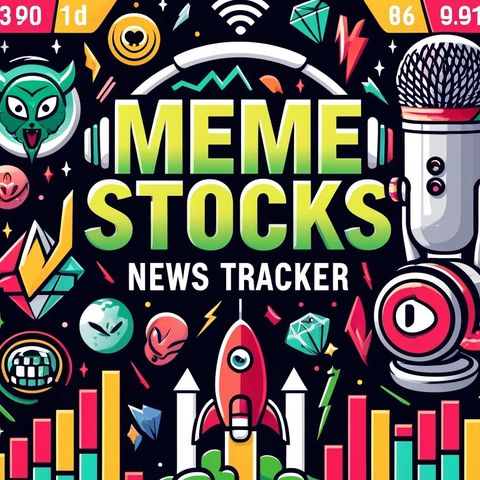Meme Stocks: Navigating the Thin Line Between Investment and Speculation in the Digital Age

Sign up for free
Listen to this episode and many more. Enjoy the best podcasts on Spreaker!
Download and listen anywhere
Download your favorite episodes and enjoy them, wherever you are! Sign up or log in now to access offline listening.
Description
Meme stocks—those favored not for their financial fundamentals but for their popularity online—have exploded in relevance and volatility with the rise of social media's influence on investing. Such stocks often...
show moreThe term "meme stock" gained prominence notably during the GameStop trading frenzy in early 2021. This phenomenon occurs when traders on platforms such as Reddit's WallStreetBets rally around stocks, causing dramatic price movements based on social and speculative pressures rather than traditional financial metrics. These investors, many of them millennials, often engage in this form of trading both as a form of entertainment and as a cynical protest against what they perceive to be a rigged financial system dominated by Wall Street and elite investors.
Notable in the digital age is the role that data visualization and interpretation play in influencing investor behavior. Technical analysts and chart experts, like those referred to as "Chart Masters," leverage YouTube and other platforms to share insights into the momentum moving these stocks. They utilize various charting methods to predict or rationalize price movements, tapping into patterns and trends that might suggest future activities. While these predictions can be highly speculative, they add an additional layer of excitement and mystique to trading meme stocks.
The phenomenon has become so pervasive that financial veterans like Jim Chanos, famous for predicting Enron's collapse, have openly discussed the implications of meme stocks on broader markets and individual investment strategies during various media interviews. Chanos has spoken about the intersection of artificial intelligence, market trends, and such stocks, highlighting how technologically-driven algorithms and machine learning might further influence speculative trading activities.
This speculative fervor not only encapsulates stocks like GameStop but also extends to other companies like Tupperware, which saw a spectacular rise in their stock value attributing to meme stock mania. However, it's crucial to recognize that these movements are not traditional indicators of a company's health or future performance. For instance, the volatile swings in meme stocks often lead to substantial losses as quickly as gains, a reality starkly portrayed in media coverage of stocks like Trump Media—which experienced significant losses post high-profile events.
Strategists and financial advisors like Doug Boneparth have pointed out the risks associated with this kind of investment, especially for millennials who might be overly cash-dependent or unfamiliar with more conventional and stable investment avenues. The influx of capital into meme stocks especially underlines a shift in investment philosophy among younger investors, who are often more willing to embrace risk for the potential of high immediate returns.
Moreover, the widespread coverage by outlets such as Bloomberg and CNBC suggests a broader market interest in understanding and potentially capitalizing on these movements, albeit carefully. The dialogue around meme stocks is not solely centered on their financial implications but also their cultural and social impact, reflecting a shift in how the current generation views money, investment, and the stock market narrative.
As financial landscapes continue to evolve with technological advancements and cultural shifts, meme stocks serve as a crucial study of mass psychology, market strategy, and the transformative power of social media in the investing world. While enticing, they caution the tale of navigating the thin line between strategic investment and speculative gambling.
Information
| Author | QP-4 |
| Website | - |
| Tags |
Copyright 2024 - Spreaker Inc. an iHeartMedia Company
